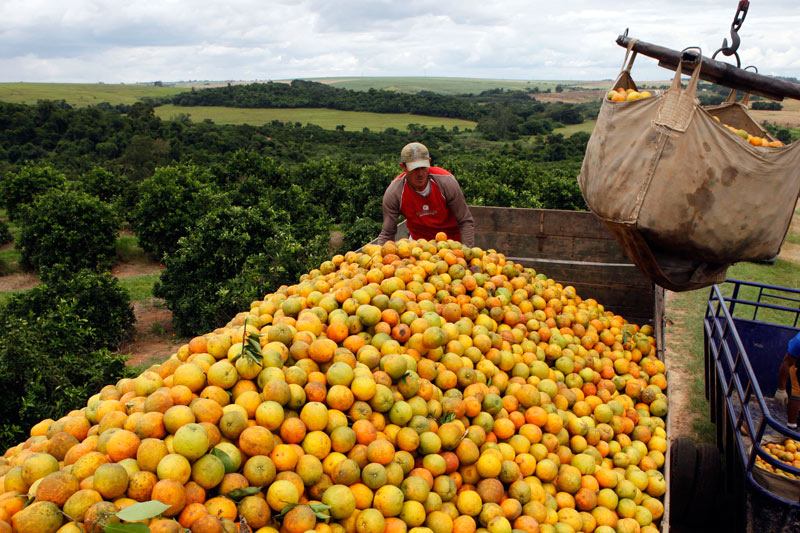By Connor Adams Sheets - The bleak outlook for Florida's multibillion dollar citrus industry’s growing season will mean fewer jobs for seasonal workers and a big hit to the state’s economy, experts predict. Analysts expect the state to produce its smallest citrus crop in five decades during the season beginning next month, as up to 75 percent of the state’s 65 million citrus trees are infected by the insidious “greening” disease.
The disease is likely to eliminate a large swath of this year’s citrus crop, posing a serious threat to a longstanding way of life for tens of thousands of largely Mexican seasonal workers and the Sunshine State’s economy -- and even its identity.
“The impact on the economy is difficult to assess, but it is in aggregate a $9 billion industry,” Dr. Fariborz Ghadar, a professor at Pennsylvania State University’s Smeal School of Business and senior advisor at the Center for Strategic and International Affairs in Washington, D.C., said. “If that’s hurt by, say, 30 percent -- I don’t have an estimate for how much the citrus is being hurt, but reports say it’s serious -- the impact on the Florida economy is billions of dollars. So this is not an insignificant issue.”
The citrus industry in Florida, which represents 70 percent of domestic orange production and employs 75,000 people, has been a major driver of income and employment for the state for decades. But that rich heritage is increasingly imperiled by greening, a common shorthand for an insidious bacteria carried and spread by tiny insects called Asian Citrus Psyllids.
First identified in Florida at least 15 years ago, greening -- known as huanglongbing or “the yellow dragon” in China, where it was originally reported in 1943 -- the disease affects infected trees’ vascular systems, eventually killing the trees.
The disease is leaving little hope for the future of an industry that NPR reports has seen orange production halved over the past ten years, with only about 100 million boxes of the fruit produced last year.
About $90 million has been spent in Florida on research aimed at finding a way to end the scourge of greening since 2008, according the Associated Press. But no cure has been found to date, and experts say that the industry’s 40,000 to 55,000 seasonal, mostly seasonal and immigrant workers will be among those hardest hit by the resulting decrease in citrus production.
Though these types of jobs are typically some of the nation’s lowest paying, the workers who travel to America from Mexico and other countries to fill them during the citrus growing season via the nation’s H-2A guest worker visa program depend on the income they provide, and local businesses rely on their spending.
“While the loss of jobs and income will be devastating for these workers, the knock-on effects will be noticeable in rural Florida,” Jeff Born, a professor at the D’Amore McKim School of Business at Boston’s Northeastern University, said via email. “Because of their low incomes, these farm workers tend to spend just about everything they make (or send it back home) -- so small businesses all throughout rural Florida are likely to feel the pinch, too.”
Meanwhile, the federal government has been slow to issue the H-2A visas that allow seasonal workers to work in Florida citrus groves, as the political debate over immigration has raged in Washington.
“The H-2A visas, they’re a government responsibility. Delaying this, in particular when the citrus industry is hurting, is inexcusable,” Ghadar said. “Immigration has become such a sensitive issue that nobody wants to stand up and do the right thing and issue the visas, so [it seems] the best thing to do is sit on your hands and no one can blame you for it. But it’s yes and no. The economy needs immigrants.”
Orange juice sales continue to slide, hitting a record low of 34.96 million gallons in the four weeks that ended Aug. 2, down 9.2 percent over a similar period in 2013, according to Nielsen data cited by the Wall Street Journal. That decrease can be chalked up both to the puny domestic citrus crop and consequent higher prices. Frozen, concentrated orange juice futures are up, trading at $1.47 a pound on the ICE Futures U.S. exchange as of Aug. 18, representing a jump of 5.6 percent this year.
And experts expect prices to rise even higher as the coming season's citrus crop is expected to be even more dismal. Price-conscious consumers may increasingly choose to do without O.J., which has for decades been by far the country's most popular fruit juice.
